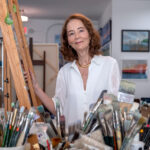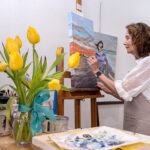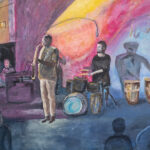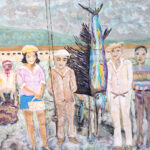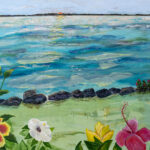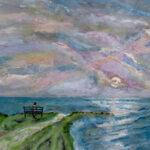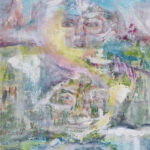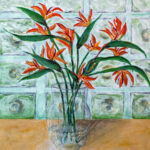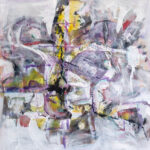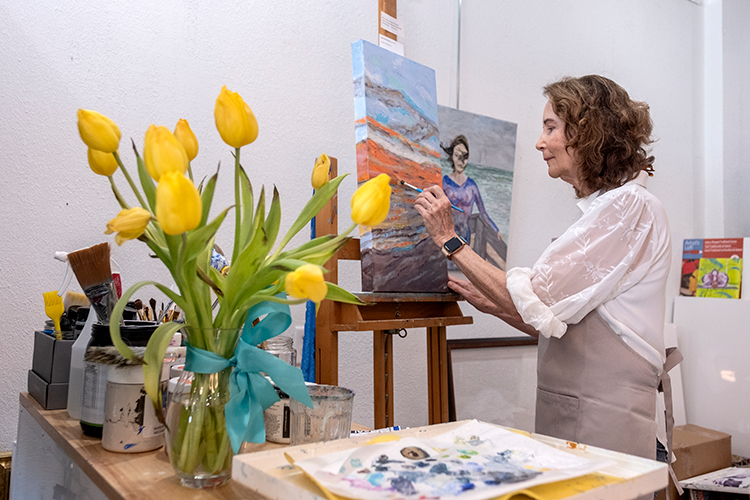
Suzanne Roff considers herself an island lady. She currently resides on the barrier island, spent many years on the isle of Manhattan, and was raised in the 1950s and 1960s in Key Biscayne.
“When I grew up, there were only 300 families on the island, and I could shimmy up a coconut tree. A magical place, we only had a gas station, church and a drugstore. In many ways this is why I came back to Florida, even though I never thought I would,” says Roff.
“I see the sea grapes, the gardenias, the palm trees, imprinted in my brain since childhood. Those early nature sounds, the trees and images are what is familiar,” she says.
“Vero was a happy surprise. It’s almost unspoken that there is something very powerful here. This is a very magical place; there is some vortex of energy that’s just here, and an artistic energy that draws artists for whatever reason. They just come.”
Roff is now immersed in that vibrant arts community. She shares space downtown at Studio on Sixty, which adjoins Gallery Veritas, where her exhibition – “So Revealing” – is on display through May 31.
Prior to relocating to Vero Beach, Roff obtained a B.A. at the University of Miami, a Master of Professional Studies at the New School University, and a Ph.D. in counseling psychology at New York University, where she was an adjunct professor for 20 years.
“I reinvented myself after losing a number of people to COVID, including my first husband in March 2020, before they really knew about COVID,” Roff says.
She feels her pursuit of looking into and beyond other dimensions in her artwork is an offshoot of her psychological training.
“For me, painting is a calling in which something unexpected awaits, where meaningful coincidences appear. I’ll probably try the rest of my life to capture that in the two-dimensional. You have to feel it viscerally, you have to feel it in your soul,” she explains.
Roff says she prefers to paint in silence, avoiding any background music or distractions that might jar her mood. Her style is somewhere between intentional and unintentional.
“I don’t try and control the brush. Not just because I was a psychologist, but I do trust the process, our intuition, our unconsciousness, this sixth sense. And yet I would like to understand even more, to make the invisible visible. I want to do something that kind of pulls on the unconscious,” says Roff, adding that one of her paintings came to her in a dream, where she was viewing earth from outer space.
“When I go to the canvas, I just start something, and I keep painting and I see something that emerges. I call it meaningful coincidences or synchronisities, and I am always surprised to see what comes out, because it wasn’t necessarily intentional. But I trust the subconscious to lead the way. And so I am kind of painting to please myself to make it what’s meaningful to me, as opposed to a more commercial bent, but I would also like to do both.”
Roff has experienced hardship and loss in her life but has been able to use those to transform into an enlightened soul.
“It’s good to be at this point in life. I don’t feel I need to prove anything to anyone; I feel so centered and confident in my life. Having lost people and things I love, now I can bear what’s next,” says Roff.
“As an empowered woman, I’ve never felt as strong and productive in my life. Every day is meaningful in some way. Everything is biased from my past. I’d rather paint than play tennis or golf. I did try them but gave them up; they didn’t have meaning for me.”
Roff prefers painting in acrylics and can be inspired by everything from old narrative memories to a dream image, wanting the viewer to see into and beyond.
“I want the paintings to draw from the subconscious.”
She watches the sun rise at least once a week, calling it her “spiritual communion with the world,” and also enjoys viewing the full moon come up over the horizon.
“We are so lucky living here. Where else can you see something like that? Something that happens in nature. It gives me a sense of awe and joy, and a grounding with the earth. I am usually alone when I see these,” says Roff.
“To me, it’s a message from the universe, that this is where you are supposed to be. To ground myself in nature, something eternal, timeless. I do try to capture nature’s rhythms in my artwork, to capture that feeling, that mystery, that awe. I try to remain in a space of curiosity about what wants to hide and what wants to reveal itself.”
Roff’s painting, “A Night in Cienfuegos,” explores a musical and visual memory of a night in Cienfuegos, Cuba, about seven years ago. Her goal was to “capture the archetypal interplay of light, shadows, human figures and musical instruments.”
That work was accepted for the upcoming Treasure Coast Creates: A Tribute to Local Artists exhibition, which opens May 16 at the Vero Beach Museum of Art.
Another, “Totem and the Four Elements,” depicting a totem pole with four faces representing water, earth, fire and air, came about after a healing acupuncture session, where “energies become open to the emergent creative possibilities.”
In “Market Life,” depicting Vero’s Farmers Market, Roff meanders through the fresh, yet perishable fruits and flowers as a metaphor for life.
About five years ago, Roff started writing a historic fiction novel based on a true story she remembered hearing as a child of a little girl, Marie Cecile Clement, who entered this country smuggled in a sugar barrel. Researching with the help of French genealogists, while she didn’t find any record of the girl, she did find the family in what is today Haiti.
The Clement family emigrated to what was then Saint-Domingue a very wealthy French colony, rich in sugar and coffee and known for its brutal slave system. Her novel covers the family for some 100 years, ending just before 1791, the start of the successful slave rebellion. Roff hopes to finish the novel before the end of the year and get it published, describing herself as “a bit schizophrenic” as she divides time between painting and writing.
Adding to her interests, Roff is directress general of the ‘Society of Daughters of Holland Dames, Descendants of Ancient and Honorable Families of New Netherland,’ which promotes the legacy of Dutch settlers in this country prior to 1674, when New Netherland was turned over to the English.
“What I like about having Dutch ancestry, under the 40 years they reigned here, women could own property and they could use their maiden name. The British ended that. Also, our U.S. constitution is based on the Dutch constitution,” says Roff.
Photos by Joshua Kodis

